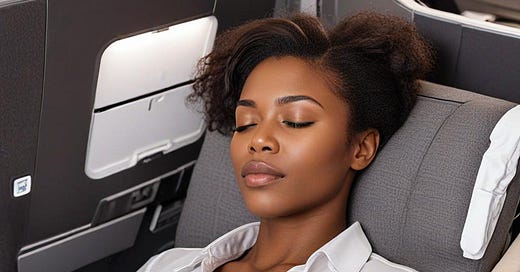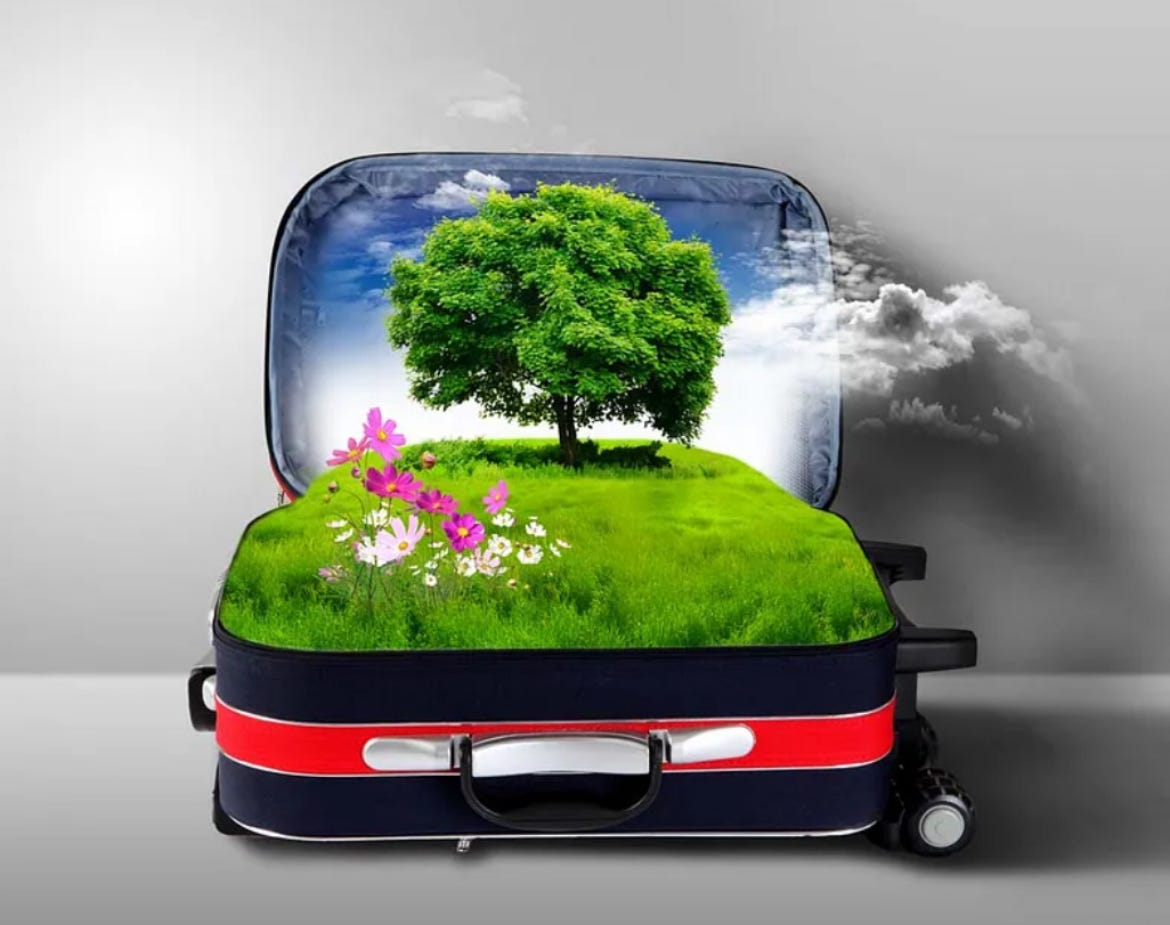GREENING THE GLOBETROT
I grew up in a family that goes places. My Jamaican parents met and married in London🇬🇧 and raised my younger sister and I in Britain, Jamaica and Canada, and then my sister and I lived in the USA for decades. Like so many people I have friends and family scattered about the planet who I dearly love and thus love to visit. And my insatiable curiosity means I love to go to foreign places — whether domestic or international — on my own and on a whim and on a dime. And when I spent a decade as a remote worker, who was always on the hunt for a travel deal (thanks to Skyscanner, Airfarewatchdog and The Flight Deal), I was bounded only by my teaching schedule as to what day I got on that plane or took that train, bus or automobile.
But as a tree-hugging greenie, I always feel conflicted about the impact of my travels on the planet I so love to enjoy. I admit I am a yellow/mellow — brown/down, dry my clothes on a rack, recycler/composter, glass instead of plastic, organic, locavore, Sierra Club-member kind of greenie. I swim and kayak and camp and sail and hike and stand up paddle board and even got certified as a scuba diver. So I care about keeping water clean because I like to be in it. The trees matter to me because I love seeing them, being among them and I like how they clean my air. I gave up my car almost a decade ago, and thus am a huge fan of public transit, but it doesn’t mean I never drive. I still need a car to get across Montana or Arizona after flying on a plane that pollutes.
So how do I reconcile my love of travel and my desire to care for the planet?
I care about how I go. Some methods of travel have been shown to be more destructive to the planet than others. Cruise ships have been maligned for dumping sewage into the ocean and generating tons of garbage, though they have been taking steps to change that image. They also generate lots of garbage and the impact of dumping thousands of people into a city for one day has caused cities like Venice to fight back with regulations that limit how many ships visit the city. Planes pollute so if the airline allows me to pay for my carbon footprint then I do. It’s usually less than $10 a trip and my conscience gets assuaged a little. Speaking of footprint, I love wandering streets and getting lost in the wonder of the wander. And walking is also a really great way to burn off the calories gained from sampling the food. TBH I wish I was more of a cyclist, because this is as green a way to explore as they come.
I care about where I stay. I choose eco-friendly places as much as possible. I like hotels, Airbnbs and hostels that brag about how they care for the planet. And when I do stay at hotels, I skip the daily house-keeping and re-use my towels and glasses.
I minimize my waste. I drink tap water as much as possible, limit my use of plastics, and when I have the choice I choose glass or cans. I always bring my own water bottle, and my own tote bags to carry my stuff.
I eat local. Enjoying the food of a country is one of the joys of being there. If inland I opt out of seafood, and enjoy what the rivers and land have to offer. And when buying food I prefer to buy unpackaged, and as close to the food supply as possible. That means exploring local food markets for the fresh and unique choices that each place provides. Nothing says travel to me like local foods.
I buy local. Ain’t no way I’m buying anything made in China unless I’m in China. My souvenirs are made by local artisans from local and sustainable materials, and follow local laws about what is legal to buy, and transport out of the country. This supports creatives and local economies, and forever connects me to the place in a meaningful way.
Ultimately, I am only one traveler and the little I do is not enough to make a big impact. But by engaging in conversation with other travelers, and advocating for vendors to do more, my hope is that more travelers will become more conscious of the choices they make, and take steps to preserve the earth we wander to enjoy.
ADJUSTING FOR JETLAG
Thirty years on the west coast of the USA with my heart and soul deeply connected to London 🇬🇧 and Jamaica as my second homes, and two sisters on the east coast meant lots of 6 to 11-hr flights and 3hr and 8-hr lags in time. I have insomnia at the best of times, so when my brain and body can’t figure out what time to sleep or eat, it can really be a struggle to get the sleep I need to do all the things and see all the places, wherever I am.
But you don’t need to surrender to the droopy-eyed, always tiredness that comes with jetlag, there are some tried and true strategies for getting our circadian rhythm in sync when the hours where you were and where you are don’t align.
Sleep scientists suggest a calculus of 1 day for each hour of time zone delta for your bodies to recalibrate. But that’s a luxury most folks don’t have on that long-awaited dream trip. So here are some tips to ameliorate jetlag symptoms, and keep you awake when you wanna be awake and get you to sleep when the clock says you should.
1. As quickly as possible get your body on the schedule of the destination. This can start as soon as you get on your plane, and plane schedules tend to do this. If you’re arriving in the morning, planes usually go dark when it’s supposed to be night, so skip the movie, the podcast or the TikTok time suck, and try and get some zzzs on the plane. You can also try apps like Timeshifter to help you manage the time shift.
2. To bring on the zzzs bring the following: noise-canceling headphones to keep out the sounds of that baby who just can’t hold it together; a blanket to save you from the arctic air planes love to circulate (I love me a pashmina scarf for this), a pillow, eye-mask, earplugs, or use a white noise phone app.
3. Drink often. My sister doesn’t like public washrooms so she goes dry on flights, but hydration really makes a difference in reducing jetlag, and keeping fatigue at bay. Drinking lots of water counteracts the dry cabin air.
4. Choose your drink wisely. Caffeine may be your bestie in keeping your eyes open when you need to, but remember not to drink it in the afternoon or evening if you want to sleep at night. Also go light on the alcohol, especially late in the evening, because it can interrupt the deep restful sleep you need to wake up ready to explore.
5. Melatonin and magnesium are supplements that support sleep, so bring some if they work for you. If you take it, how much you take, and when you take it, is something to discuss with your health professional prior to departure.
Sleep medications. Consult with your healthcare provider if you want to consider taking sleep medications to induce sleep during your trip.
RUMINATING AND RANTING…..
I don’t know about you and your summer travels, but this year’s hot season airfares are giving me IBS (irritable bowel syndrome) and causing tightness in my temples.
All the Skyscanner’ing, Google Trip’ping and Kayak’ing is not doing the trick at all. So it seems I may be domesticating my distancings, localizing my lounging, and enjoying the Toronto summer, while saving my foreign goings for the cooler temps of the off-season.
Is it just me or are these flight prices also spiking your blood pressure?
Do you have any other tips for greening your travels, or beating jetlag? If you do, I would love it if you would share in the comments, so we can all benefit from your traveling wisdom.
.






Lovely article with practical tips.